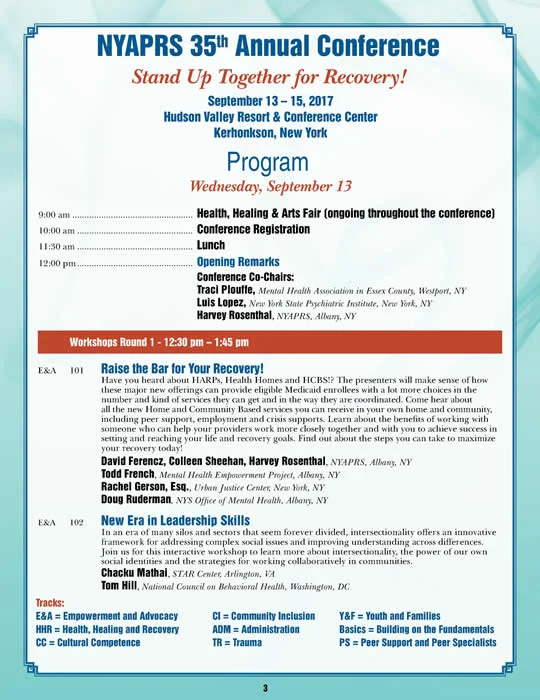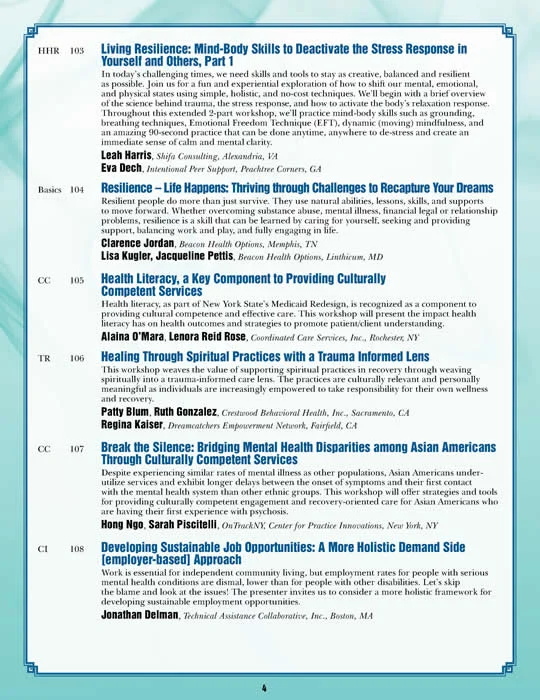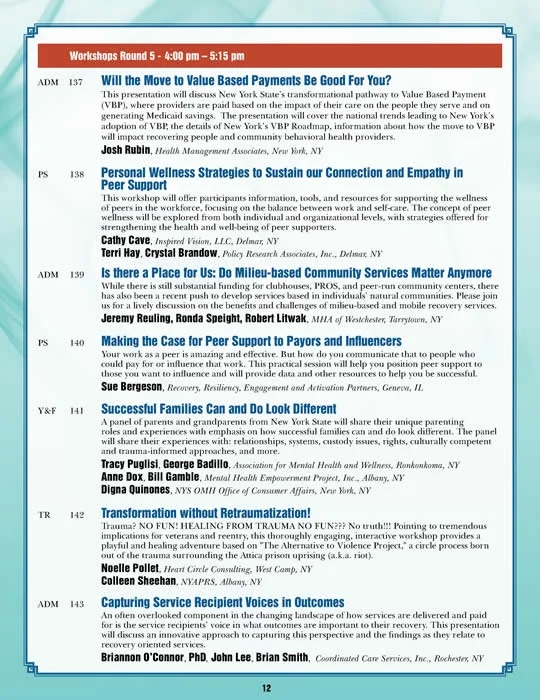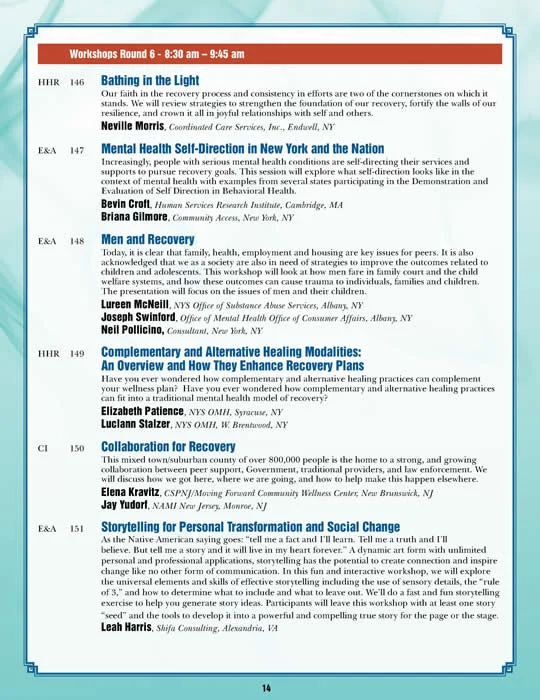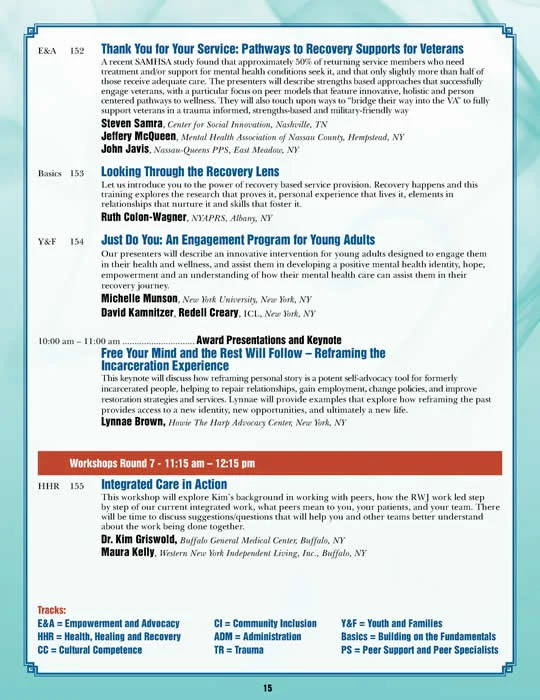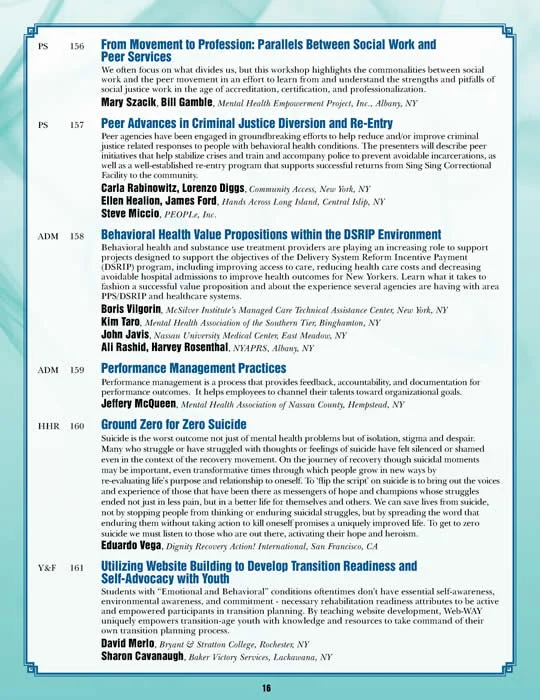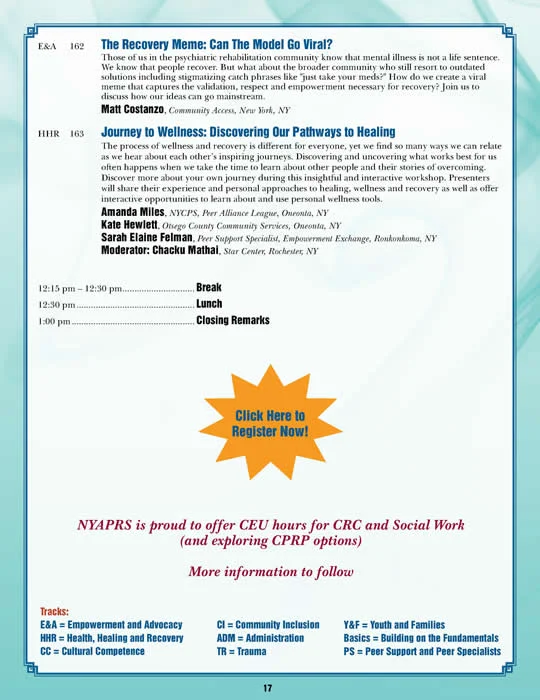Monday, August 21, 2017
NYAPRS Note: There’s only one month to go to this year’s NYAPRS 35th Annual Conference, ‘Stand Up Together for Recovery’ to be held September 13-15 at the Hudson Valley Resort in Kerhonkson, NY!
This year’s NYAPRS Annual conference once again features an extensive mix of presentations on peer support and peer run services, including some deeper dives into what constitutes true intentional peer support, how peers can best operate in clinical environments, the distinctions between peer specialists and community health workers and social workers and tips on making the case for peer support to payers. See below for details about these and other workshops on peer support and peer services.
Also, we want to highlight that, once again, CEUs are available for social workers, certified rehabilitation counselors and certified psychiatric rehabilitation practitioners who attend specified presentations at our conference
Register today at https://rms.nyaprs.org/event/?page=CiviCRM&q=civicrm/event/info&reset=1&id=24
—————————-
Introduction to Intentional Peer Support
Come explore Intentional Peer Support, a model for thinking about and intentionally inviting powerfully transformative relationships among peers. Participants learn to use relationships to see things from new angles, develop greater awareness of personal and relational patterns, and to support and challenge each other as we try new things.
Eva Dech, Intentional Peer Support, Peachtree Corners, GA
Who Defines “Peer Support?” The Danger of Substituted Values and Voice
This presentation will explore how peer support has morphed into paid staff positions within traditional mental health agencies over the past 20+ years, and how this process has changed the field’s understanding of peer support. It will explore the processes through which this happened and offer recommendations for redefining terminology to distinguish between these very different types of roles and safeguarding the future of genuine peer support.
Darby Penney, Advocates for Human Potential, Albany, NY
The Expanding Role of Peer Support: Health, Wellness, and Community Connectedness
The presentation will provide information and education about whole health and wellness approaches for peer supporters to guide their work.
Thomas Lane, Magellan Public Sector Solutions, St. Pierce, FL
From Isolation to Connection: The Role of Authentic Peer Support in Fostering Community Inclusion
This workshop will discuss the social determinants to health and how these factors contribute to poor outcomes and under-service for many marginalized populations. The discussion will then focus on one key social determinant: social isolation, and discuss how to use authentic peer support to promote community inclusion and wellness.
Todd French, Mental Health Empowerment Project, Albany, NY
The Competitive Advantages of Behavior Health Peers and Community Health Workers
Paid peer support specialists and recovery coaches have grown up alongside the emergence of the community health worker (CHW) movement. Are they the same? Should peers become CHWs? Should CHWS be trained as peers? This session will look at the competitive advantages of each field and consider when each might best be deployed.
Sue Bergeson, Recovery, Resiliency, Engagement and Activation Partners, Geneva, IL
Keeping our Peerness: Opportunities and Challenges to Integrate Peers in Clinical Teams, ACT and Beyond
The presenters will help you to identify strengths and challenges of peer specialists working in ACT team and across the range of clinical programs. People attending this workshop will also learn how to prepare non-peer staff to welcome peers to the teams.
Sascha DuBrul, ACT Institute/OnTrack at CPI, New York, NY
Luis Lopez, New York State Psychiatric Institute, New York, NY
Helle Thorning, PhD, ACT Institute at CPI, New York, NY
Denise Ranigan, Mental Health Association, Kingston NY
Personal Wellness Strategies to Sustain our Connection and Empathy in Peer Support
This workshop will offer participants information, tools, and resources for supporting the wellness of peers in the workforce, focusing on the balance between work and self-care. The concept of peer wellness will be explored from both individual and organizational levels, with strategies offered for strengthening the health and well-being of peer supporters.
Cathy Cave, Inspired Vision, LLC, Delmar, NY
Terri Hay, Crystal Brandow, Policy Research Associates, Inc., Delmar, NY
Making the Case for Peer Support to Payors and Influencers
Your work as a peer is amazing and effective. But how do you communicate that to people who could pay for or influence that work. This practical session will help you position peer support to those you want to influence and will provide data and other resources to help you be successful.
Sue Bergeson, Recovery, Resiliency, Engagement and Activation Partners, Geneva, IL
From Movement to Profession: Parallels Between Social Work and Peer Services
We often focus on what divides us, but this workshop highlights the commonalities between social work and the peer movement in an effort to learn from and understand the strengths and pitfalls of social justice work in the age of accreditation, certification, and professionalization.
Mary Szacik, Bill Gamble, Mental Health Empowerment Project, Inc., Albany, NY
Peer Advances in Criminal Justice Diversion and Re-Entry
The presenters will describe peer initiatives that help stabilize crises and train and accompany police to prevent avoidable incarcerations, as well as a well-established re-entry program that supports successful returns from Sing Sing Correctional Facility to the community.
Carla Rabinowitz, Lorenzo Diggs, Community Access, New York, NY
Ellen Healion, James Ford, Hands Across Long Island, Central Islip, NY
TBA, PEOPLe, Inc.-+


